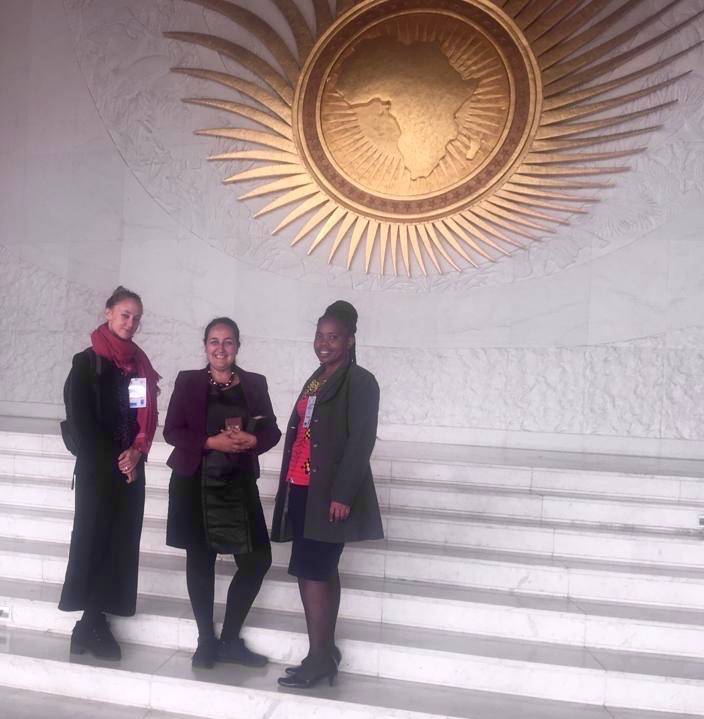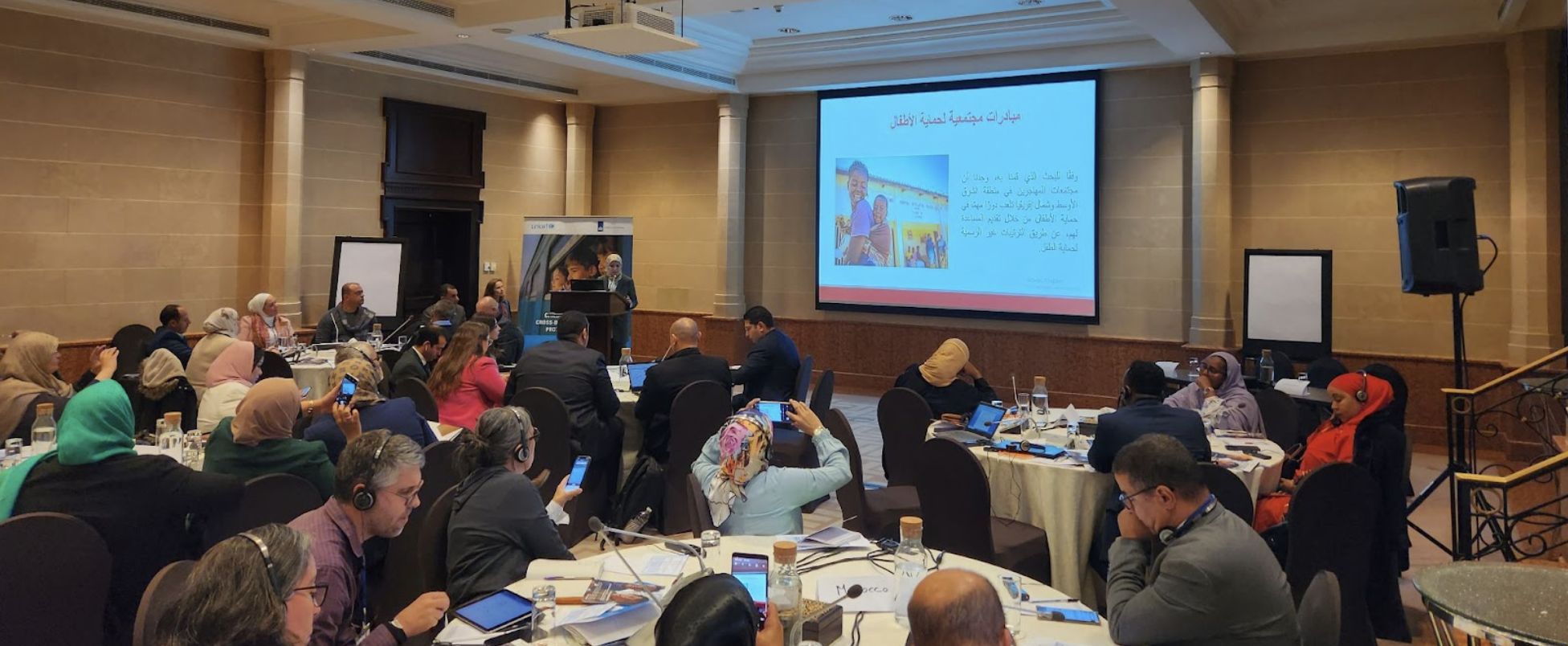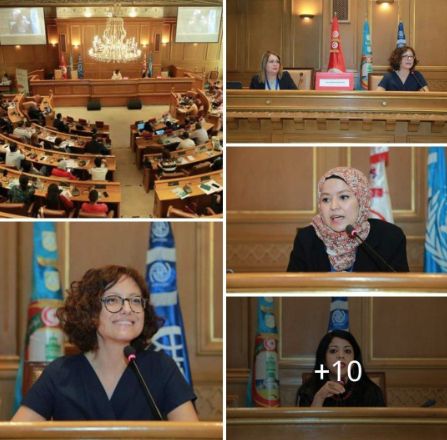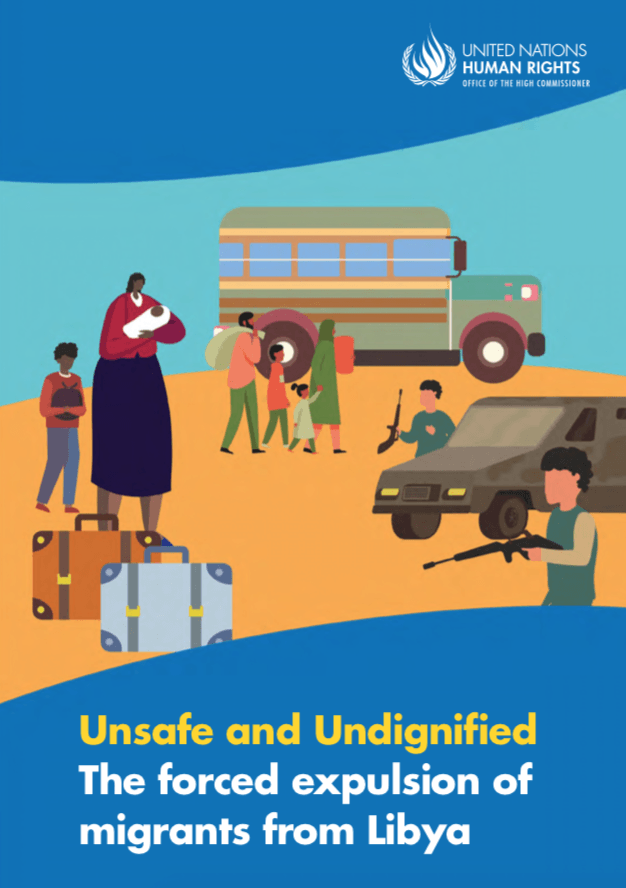IDC-UNICEF Joint Workshop: Children on the Move Cross Border Continuum of Protection & Care
In late November 2022, IDC and UNİCEF co-organised a three-day workshop entitled “MENA Regional Children on the Move Cross Border Continuum of Protection and Care” in Amman, Jordan. The workshop brought together 8 governmental delegations from across the MENA region representing key institutions and policymakers - all of whom shared promising protection and care arrangement practices for children on the move. IDC and UNICEF, as well as regional representatives of IOM and UNHCR, presented on the frameworks and mechanisms to ensure the protection of children on the move, and facilitated governmental exchanges and dialogues on these matters. Further, representatives from two national and regional governments neighbouring the region, Turkey and Catalonia, were invited to present their perspectives and implementation of the Cross-Border Coordination and the Continuum of Protection and Care.
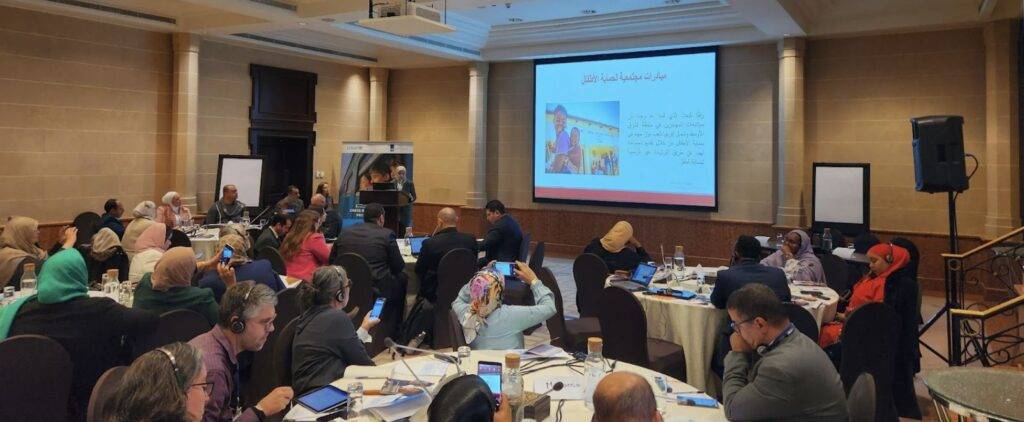
This workshop came together following over a year of collaborative work between UNICEF and IDC to implement a regional project aimed to further explore the experiences of refugee and migrant children in the region, and assess policies related to their protection, and best practices of care in different countries. Two policy briefs developed from this research were introduced at the workshop. One brief focuses on findings related to regional promising practices of Whole-of-Government and Whole-of-Society Approaches, and the other brief highlights practices regarding Community and Family Based Alternative Care Initiatives in the Region.
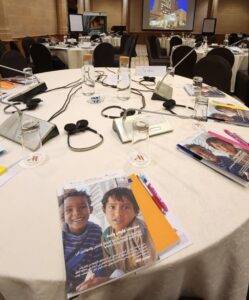
The workshop included a variety of presentations covering the protection of children on the move. IDC’s MENA Regional Programme team Amera Markous and Asma Nairi aimed to elevate human-rights based approaches by detailing models for alternatives to detention, case management and referral mechanisms.
IDC Executive Director Carolina Gottardo presented on case management, and how it can be utilised as a protection tool for children on the move. Carolina provided both technical aspects and examples of practical implementation from different regions. She also presented on the importance of the whole of government and whole of society approaches for the region.
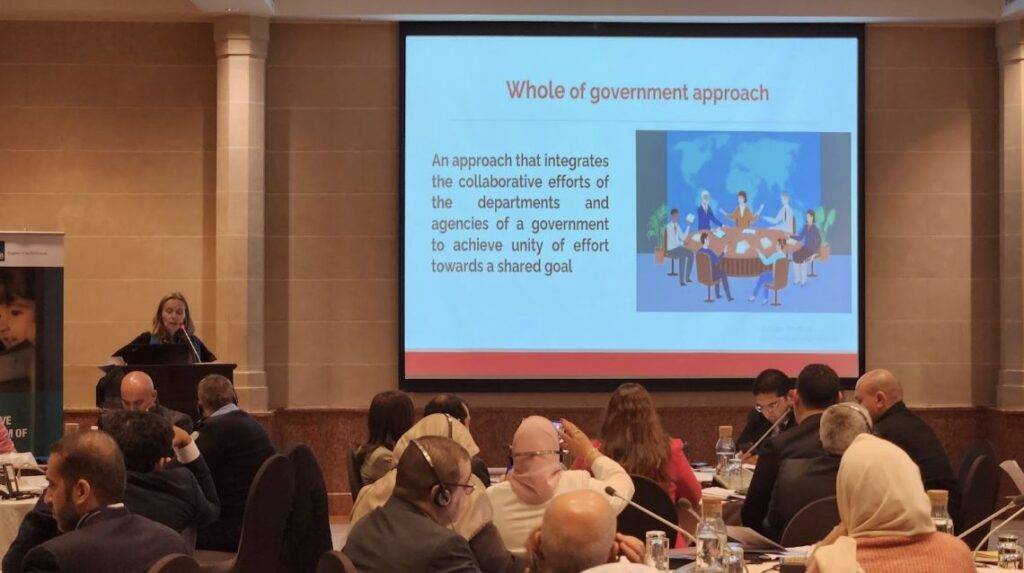
IDC MENA Regional Coordinator Amera Markous shared the concept and implementation of Alternatives to Detention (ATD) highlighting the importance of community and family-based alternative care for migrant and refugee children. Throughout the workshop, governments were able to engage in country level group activities to explore further solutions and policy initiatives based on the tools presented and the outcomes of the inter-governmental exchanges.
This workshop was a successful milestone in the MENA region towards enhancing awareness and joint work with UNICEF and with governments in the region. Moving forward, IDC will continue working jointly with relevant actors to implement better solutions to guarantee the protection of children on the move in the MENA region.
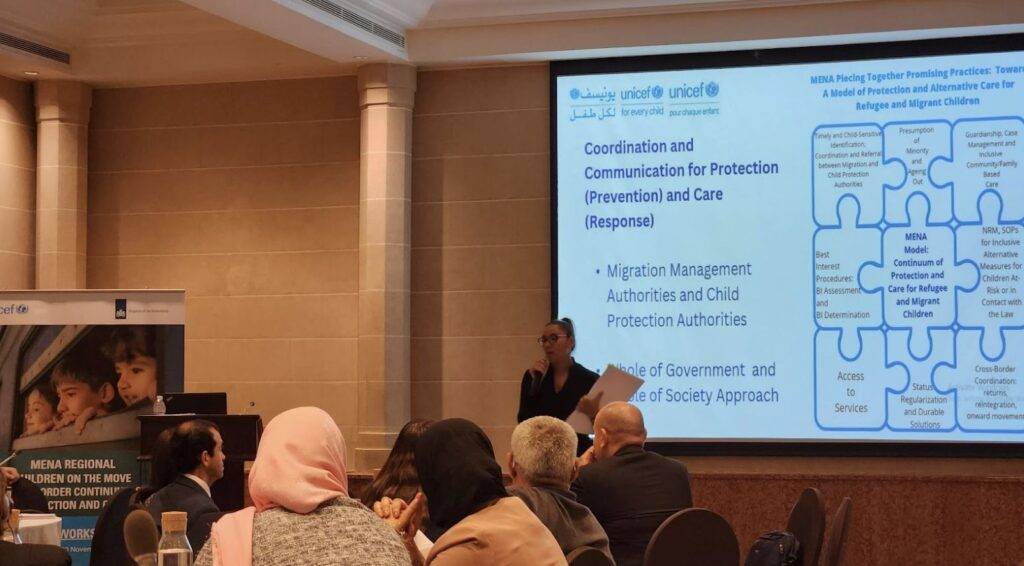
An Interview with IDC Member: Terre D’asile Tunisia
IDC aims to highlight the critical and important work to end immigration detention being implemented by civil society actors in the MENA region. IDC’s MENA Programme recently interviewed Sherifa Riahi, Country Director of Terre D’asile Tunisia to share insights on these efforts in the region.
Terre D’asile Tunisia was founded in 2012 in Tunisia as a section of Terre d’Asile France. Its mission is to enhance social cohesion and protection, and promote the rights of migrants, refugees, people seeking asylum, unaccompanied minors, and human trafficking survivors living in Tunisia.
Challenges facing migrants and refugees in Tunisia
Sherifa explained that the arbitrary arrest and detention of refugees continues from time to time. Further, there are discriminatory practices based on skin color, ethnicity, social class and language. In addition to arbitrary detention, the lack of a case management system makes the situation more challenging. There is no proper identification of trafficked persons to ensure appropriate care, or proper age assessment of children to ensure referral to child protection authorities.
Interpretation services are severely limited, which means that migrants are not provided with information about their rights, detention, or complex migration processes in languages that they understand. Additionally, Tunisia does not finance deportation processes, and so those facing deportation must expense their own return.
The work of Terre D’Asile and other civil society organisations
Tunisian civil society works to support migrants and refugees facing these concerning conditions and situations. Terre D’asile Tunisia plays an important role in implementing different support mechanisms throughout people’s experience in Tunisia. Terre D’asile Tunisia provides legal support to people in detention, including legal consultations, reporting mistreatment to public institutions, and particularly supports the detention cases of trafficking survivors and children. Terre D’asile Tunisia also provides social assistance to those who are detained, through the delivery of essential items, such as hygiene kits.
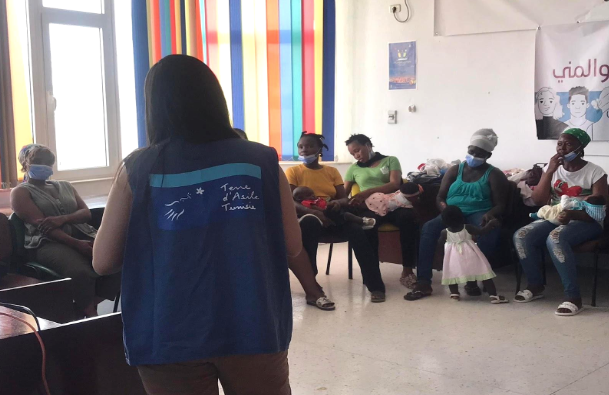
Key highlights in the past period
- Terre d’Asile Tunisia is part of a Working Group on Arbitrary Detention, alongside Organisation Mondiale Contre la Torture (OMCT), Avocats Sans Frontieres (ASF) and Forum Tunisien pour les Droits Economiques et Sociaux (FTDES). This Working Group has recently been able to secure the release of more than 25 people from detention in Tunisia.
- Terre d'asile Tunisia is currently establishing a new day care center for migrant and Tunisian children in vulnerable situations which will be operating in January 2023. The organisation leads this project, and uses a case management approach to provide tailored support that responds directly to children’s needs. An initial reception and needs assessment is completed, followed by a response plan addressing the most urgent needs, as well as long-term support for the development of their lives and futures.
MENA Regional Programme Updates
IDC’s MENA Regional Coordinator Amera Markous recently presented at the the 7th edition of the Summer School on Migration in Tunisia, organised by IOM Tunisia in partnership with the National Institute of Labor and Social Studies (INTES) in September 2022. The forum’s theme was “Children and Migration,” and IDC provided a comprehensive introduction to alternative care options for migrant children, and presented several examples of alternatives to detention (ATD) from the Middle East and North Africa (MENA) region, as well as from other regions. The video recording of IDC’s intervention is available here in Arabic.
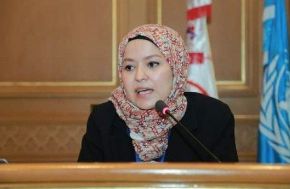
The presentation focused on the impacts of detention on children, such as the severe harm to children’s physical and mental health, and overall wellbeing. IDC also reminded the audience that detention is never in the best interest of the child, as per the Convention on the Rights of the Child (CRC). IDC MENA Regional Coordinator explained the positive impacts of ATD, based on evidence and research carried out by IDC across different parts of the world. Additionally, Amera highlighted promising practices towards ending child immigration detention, which reflect the role of the governments, legislators, civil society, UN agencies and local communities including leaders with lived experience in creating whole-of-society and whole-of-government implementation of ATD that can protect and uphold the rights of migrant and refugee children. Such examples are featured in IDC’s recent report: Gaining Ground: Promising Practice to Reduce & End Immigration Detention.
Capacity Building for Civil Society in MENA
In partnership with UNICEF, IDC organised an online ATD training on 20 October 2022. The training focused on screening, assessment, referral mechanisms of children, as well as case management and community placement options for children. IDC believes that these critical elements serve as a framework for identifying and developing rights-based ATD. This training aims to strengthen the capacity of civil society organisations, as well as bring together a network of actors working in the field of ending child immigration detention across the region.
Our training was attended by 50 participants working on issues related to refugee and migrant children from more than 10 countries in the MENA region. Continue to follow us for future updates!
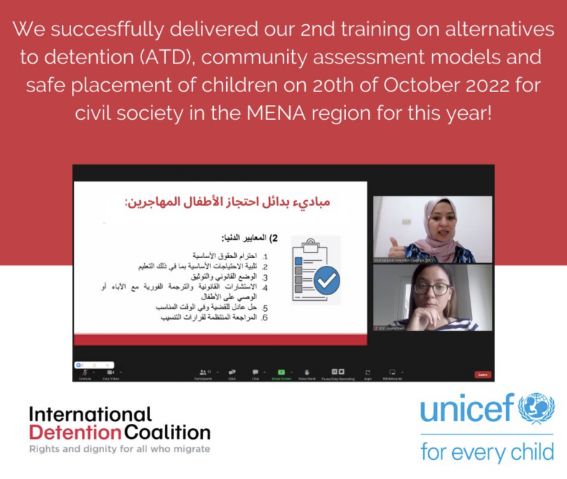
An Interview with IDC Member: Terre D’asile Tunisia
IDC aims to highlight the critical and important work to end immigration detention being implemented by civil society actors in the MENA region. IDC’s MENA Programme recently interviewed Sherifa Riahi, Country Director of Terre D’asile Tunisia to share insights on these efforts in the region.
Terre D’asile Tunisia was founded in 2012 in Tunisia as a section of Terre d’Asile France. Its mission is to enhance social cohesion and protection, and promote the rights of migrants, refugees, people seeking asylum, unaccompanied minors, and human trafficking survivors living in Tunisia.
Challenges facing migrants and refugees in Tunisia
Sherifa explained that the arbitrary arrest and detention of refugees continues from time to time. Further, there are discriminatory practices based on skin color, ethnicity, social class and language. In addition to arbitrary detention, the lack of a case management system makes the situation more challenging. There is no proper identification of trafficked persons to ensure appropriate care, or proper age assessment of children to ensure referral to child protection authorities.
Interpretation services are severely limited, which means that migrants are not provided with information about their rights, detention, or complex migration processes in languages that they understand. Additionally, Tunisia does not finance deportation processes, and so those facing deportation must expense their own return.
The work of Terre D’Asile and other civil society organisations
Tunisian civil society works to support migrants and refugees facing these concerning conditions and situations. Terre D’asile Tunisia plays an important role in implementing different support mechanisms throughout people’s experience in Tunisia. Terre D’asile Tunisia provides legal support to people in detention, including legal consultations, reporting mistreatment to public institutions, and particularly supports the detention cases of trafficking survivors and children. Terre D’asile Tunisia also provides social assistance to those who are detained, through the delivery of essential items, such as hygiene kits.

Key highlights in the past period
- Terre d'Asile Tunisia is part of a Working Group on Arbitrary Detention, alongside Organisation Mondiale Contre la Torture (OMCT), Avocats Sans Frontieres (ASF) and Forum Tunisien pour les Droits Economiques et Sociaux (FTDES). This Working Group has recently been able to secure the release of more than 25 people from detention in Tunisia.
- Terre d'asile Tunisia is currently establishing a new day care center for migrant and Tunisian children in vulnerable situations which will be operating in January 2023. The organisation leads this project, and uses a case management approach to provide tailored support that responds directly to children’s needs. An initial reception and needs assessment is completed, followed by a response plan addressing the most urgent needs, as well as long-term support for the development of their lives and futures.
Socio-economic Crises, Deportations & Deaths at the Eastern Mediterranean Route
The current economic crisis in Lebanon - alongside an ongoing political and health crisis - is driving hundreds of people to risk crossing the Mediterranean Sea in order to seek safety in Europe, though multiple sources insist that estimates could be in thousands. UNHCR states that the number of people who left Lebanon by sea nearly doubled between 2020 and 2021, and “the figure rose again by more than 70% in 2022….fuelled by Lebanon’s financial collapse as poverty rates have soared among the population of 6.5 million.” Such movements have also been driven by growing discrimination and resentment towards refugee communities in Lebanon and Turkey. In September, 94 people, including 10 children, drowned off the coast of Syria when a boat carrying 150 people departed Lebanon. In another case, a boat carrying 250 people departed Lebanon for Italy, and was stranded at sea for a week without food or water until being rescued by an NGO ship. On another stranded vessel, a four year old girl from Syria, Loujin, died of thirst while waiting to be rescued in September.
As people are struggling to survive these journeys to safety, Lebanon announced a plan to return 15,000 Syrian refugees every month to Syria, and Turkey is proposing to deport 1 million people to Northern Syria through daily deportations. However, voluntary returns from Lebanon are not a new phenomenon and they have commenced even before now, with various sources stating that upward of 21,000 Syrians have been returned to Syria already before the process was halted in 2020 due to COVID-19 – although the government insists that these are voluntary returns, however, there are many concerns on this.
UNHCR reports that at least 71,771 Syrian refugees have returned voluntarily from Lebanon since 2016 up until August 2022, some through government-organised trips and some on their own. Though Lebanon has begun with the Syrians who wish to return voluntarily, there is no reassurance that forced returns will not be taking place. As per the country’s Minister of the displaced, returns will continue beyond those who wish to return voluntarily, amid insistence that Syria is now safe, as the Syrian government is now welcoming Syrian refugees back to the country. However, refugees, as well as human rights groups such as Human Rights Watch, Amnesty International and other UN Agencies such as UNHCR, are concerned about the conditions of these returns. Reports by human rights organizations have cited cases of returning refugees disappearing and getting detained and tortured. Even more alarming, is the fact that the Lebanese government has excluded UNHCR from this process. Therefore, amid these realities, boats from Lebanon continue to leave the coast headed towards Europe in order to search for safety and seek protection.
At IDC, we believe that forced reparations deny freedom and asylum to people who may face persecution upon their return, and also further exacerbate the risk of immigration detention for those seeking safety and peace. IDC supports our allies working to secure safe and legal routes for people to migrate, which end the tragic loss of life occurring in the Mediterranean Sea.
This section was developed in collaboration with Dr. Jasmin Lilian Diab, Director of the Institute for Migration Studies and Assistant Professor of Migration Studies, Lebanese American University
Border Controls & Externalisation of the Asylum System
In addition to the critical situation inside detention centres in Libya, including ongoing human rights violations, the interception and forced return of people who are trying to cross the Mediterranean Sea to Europe is frequently reported (read our previous newsletter for more details). According to IOM’s Libya Maritime update, as of September 2022, a total of 16,506 migrants have been arrested and returned back to Libyan shores to date this year, 546 of whom were minors.
There are fears rising amongst activists that Italy will apply stricter border controls, deny people the right to seek asylum, and may plan reforms to offshore the entire asylum process to third countries. Further, a report indicates that this offshore approach might include strengthening the 2017 Italy-Libya agreement, and exploring similar agreements with other North African countries. In IDC’s experience, agreements that forcibly intercept and return people on the move, as well as offshore processing arrangements, can lead to further erosion of rights and increased risk of immigration detention for many.
IDC asks European States to adhere to their obligations under international law, and ensure that no more lives are lost at sea and that people’s liberty and rights are upheld as they seek safety and protection in Europe.
Written by Asma Nairi IDC MENA Programme Officer & Amera Markous IDC MENA Regional Coordinator
Updates from IDC’s MENA Regional Programme
In March 2022, IDC conducted a joint online training with UNICEF on child immigration detention issues in the MENA region, including challenges and possibilities for ending it. This was the first in a series of trainings aimed to support civil society and community organisations in the region.

IDC will be coordinating more capacity building opportunities on related topics; please stay tuned and follow our Facebook and Twitter to be the first to register!
Research and awareness raising on immigration detention
This year, IDC has been working intensively with UNICEF and also supported by the Robert Bosch Foundation funding on research to map practices and legislation related to child immigration detention in 11 countries across the MENA region. Through this process, we have identified promising practices towards ending child immigration detention and providing alternatives to detention (ATD), and will be publishing this in a report. Some of the promising practices in the MENA region are already featured in IDC’s latest global report, available here: Gaining Ground: Promising Practice to Reduce & End Immigration Detention
In June 2022, IDC’s MENA Regional Programme began a social media campaign aiming to share facts and findings on immigration detention and promising practices towards ending immigration detention in the region and globally. Follow our Facebook and Twitter to stay updated through our weekly posts and graphics in English and Arabic.
Inclusion and Collaboration with Leaders with Lived Experience
The Resourcing Refugee Leadership Initiative (RRLI) is a coalition of six organisations in different parts of the world, some of which are IDC members. The initiative focuses on promoting the leadership of refugee-led initiatives (RLIs) in the global migration and refugee rights space. In June 2022, RRLI published an open letter to UNHCR noting its concerns on the continued exclusion of RLIs from “funding streams, strategy development and decision-making processes, “including, the inability of refugee leaders to obtain visas for the annual UNHCR-NGO Consultations, and thereby excluded from the consultation process.” In the letter, RRLI acknowledges UNHCR’s extraordinary work in assisting refugees, but calls for change in key aspects, such as the inclusion of refugee leaders in decision-making. Additionally, there were calls from activists to ensure the next head of UNHCR has lived experience as a refugee, as stated in an article here.
RRLI noted that in many countries, such as Egypt, refugee leaders are excluded from meetings with UNHCR and decision-making processes, with UNHCR citing concerns about conflict of interest. RRLI has also called on UNHCR to put people with forced displacement experience and refugee leaders at the centre. IDC shares RRLI’s concerns and echoes the need to centre leaders with lived experience and ensure their agency is truly fulfilled, through not only consultation, but recognition of leadership and the specialist knowledge needed to shape the policy decisions that directly impact their own lives and the futures of their communities. UNHCR has responded to some of the asks in this letter.
Raids and detentions
Following our last blog update, the situation of migrants and refugees in Libya remains precarious. People and families continue to be subjected to ongoing arbitrary detention and human rights violations, as the UN Independent Fact-finding Mission on Libya reported in June 2022. Additionally, in April 2022, the UN Security Council Pursuant to Resolution 1970 (2011), the International Criminal Court (ICC) noted in its 23rd report that migrants and refugees in Libya have been subjected to arbitrary detention, unlawful killing, enforced disappearance and other violations that may constitute crimes against humanity and war crimes. Further, raids on migrant homes and communities continue to occur. In April 2022, authorities launched raids in migrant communities in Zuwara, arresting around 300 people,
Authorities in Tunisia have resumed using the informal Al-wardia detention centre for immigration detention purposes, which was previously closed by a court order in 2020. In response, in May 2022 28 human rights groups and civil society organisations called on authorities to stop using this informal centre to detain migrants, as there is no legal basis for its use, and there are many reported concerns regarding the conditions being experienced by migrants and refugees detained in this facility.
In Egypt, it was reported to IDC confidentially that in June authorities detained approximately 10 individuals in a round-up citing a lack of valid residency permits, regardless of their legal status with UNHCR. While those registered with UNHCR are often released within a week, however, people seeking asylum who are unregistered and still awaiting their registration appointment are at risk of indefinite detention or deportation.
Pushbacks and border controls
Pushbacks and interceptions have continued in Libya of people who have attempted to cross the Mediterranean Sea to Europe. As of May, authorities have intercepted and returned a total of 5,696 refugees, migrants, and people seeking asylum in 2022. Concerningly, 453 people have been reported missing, and 109 bodies have been recovered during this period as well.
Similarly in Tunisia, in the government’s efforts to curb irregular migration to Europe, authorities continued to arrest migrants and refugees attempting to exit Tunisia without legal documentation. In April 2022, authorities arrested and detained 155 migrants and refugees from different African countries after preventing them from crossing the sea off the coast of Sfax. Several boats that did manage to leave the coast capsised, leading to the deaths of 20 people, while 98 others were rescued.
In June 2022 in Morocco, around 1,300 to 2,000 migrants crossed from Moroccan borders to Melila enclave to reach Spain, and were then met with force and beatings that resulted in the deaths of 23 people. International human rights actors have called for immediate investigations into this incident and accountability for these killings. Human Rights Watch added that this “requires an independent, impartial investigation capable of determining what occurred and who bears responsibility for such loss of life.” This follows ongoing outsourcing of border control by Spain to Morocco, despite violations and concerns related to Moroccan management. Despite the concerns and over a year of diplomatic tensions, this agreement was further strengthened in April 2022 and later in July as the two countries renewed their migration cooperation commitments.
IDC is deeply concerned by the continued loss of life and forced disappearances of people at these borders. The deterrence mechanisms being utilised by countries in both North Africa and Europe violate international human rights standards, which most States have committed to. IDC urges States to ensure the protection, safety and freedom of people migrating, without being criminalised on the basis of their migration status.
As IDC continues to observe immigration detention trends across the MENA region, we will aim to raise awareness about the current realities and challenges, and also shed light on the gravity of the situation and experiences of migrants, refugees, and people seeking asylum in the region. As always, we believe there is an urgent need to find community-based alternatives to detention (ATD) that provide dignity to people on the move, and we call on governments to end immigration detention practices and allow for the implementation of right-based alternatives. We believe There Are Alternatives.
In May 2022, IDC engaged MENA partners and contacts working on immigration detention issues to become IDC members. IDC members engage in dialogues on emerging and important issues related to immigration detention in national, regional, and global contexts. An IDC membership provides you with opportunities to exchange ideas and develop collaborative strategies to impact immigration detention law, policy and practice around the world. If you are interested in IDC membership or more information about IDC’s MENA Regional Programme, please contact: [email protected]
Written by Amera Markous IDC MENA Regional Coordinator
Updates from IDC’s MENA Regional Programme
In December 2021, we launched an IDC Facebook Page for the MENA Region! This page will include regular updates in Arabic and English, and will also coordinate a private Facebook group for IDC MENA members to enhance ongoing engagement between our members and strengthen communication and collaboration.
Most recently in February 2022, IDC announced a new online training that we are co-organising with UNICEF on 17 March. This training will focus on supporting civil society groups and initiatives to enhance their capacity and build a network of actors working on issues related to ending the immigration detention of children in the MENA region.
IDC and UNICEF Middle East and North Africa (MENA) are carrying out research on the current state of immigration detention and the related legislations and practices in the MENA region, especially concerning children. In addition to identifying opportunities for the implementation of community-based Alternatives to Detention (ATD). The purpose of this research is to inform the International Migration Review Forum in May 2022, which serves as the primary intergovernmental global platform to discuss and share progress on the implementation of all aspects of the Global Compact for Migration.
Refugee protests and online mobilisation
In January, 600 refugees and migrants in Tripoli, Libya, were arrested and detained after protesting for months in front of a UNHCR building. They were demanding safety and protection, as well as seeking resettlement out of the country. Read more about these developments in our blog post: What’s happening in Tripoli? in English and Arabic.
Issues in Libya are similar to previous refugee protests in Egypt in 2020, where refugees in front of a UNHCR building were demanding justice following the killing of a refugee child. The protesters, who were mostly Sudanese, were detained by authorities. More recently in February 2022, refugees in Tunisia have also started protesting and demanding necessary protection assistance, including resettlement to Europe.
These examples reflect the growing need for proper mechanisms to listen and understand the concerns and challenges of refugees and migrants, and consider what is needed beyond the current systems in place. Additionally, migrant and refugee communities have started using social media to reach wider audiences internationally, using hashtags such as #EVACUATErefugeesTUNISIA4yearsisENOUGH and #EvacuateRefugeesFromLibya. Impacted communities are taking these actions to raise their voices and be heard, and to appeal to activists, organisations, and social movements beyond the borders of the countries where they feel trapped inside. Furthermore, refugee-led initiatives are increasing in the region to cover gaps in daily assistance, such as this online fundraising campaign initiated by refugee communities in Libya (GoFundMe) to support refugees and migrants with basic needs. The goal is to raise 15k euros, and they are already two thirds of the way there!
Agreements to prevent migrant arrivals in Europe continue
In Libya, despite the grave human rights violations reported inside Libyan detention centres, there are currently 12,000 migrants and refugees in immigration detention. Italy, with backing from the EU, is continuing its 5-year long agreement with Libya. Signed in 2017, this agreement provides support to Libyan Coast Guards, allowing them to intercept and return migrants crossing the Mediterranean to Europe. Despite continuation of the agreement, the UN maintains its call for a total suspension of such agreements, declaring that “Libya is not a safe port of disembarkation for refugees and migrants.”
In countries like Tunisia, agreements with European countries have not been made public. However, some organizations have raised concerns over proposals for further collaboration between Tunisia and some European states, given increased migration from the country in the last few years. So far, 5,000 Tunisians have been repatriated from Italy.
Restrictions such as these have left people on the move with limited options to seek international protection, and better economic opportunities to provide safety, stability and wellbeing for their loved ones and families. These difficult predicaments have led migrant communities to speak out about their conditions, as described above. Additionally, in January 2022, two Nigerian migrants brought a case against Italy and Libya before the UN Committee on the Elimination of Discrimination Against Women (CEDAW). Their case states that Italy and Libya failed to adhere to their international obligation to protect women’s rights with regards to the complainants, who are also victims of human trafficking. Updates on this case are said to be forthcoming in the next few months.
Deportations, repatriations and returns
In Egypt, detained unregistered people seeking asylum have limited access to UNHCR, asylum procedures or legal assistance. Human Rights Watch reported in 2021 about the poor conditions of nine Eritrean asylum seekers who were detained, including children. By the end of 2021, Egypt had deported 24 Eritreans who were seeking asylum, including adults and children. Upon return to Eritrea, these people and families face serious risks of arbitrary detention and torture by the ruling government.
In 2021, Libyan Coast Guards intercepted and returned 30,990 migrants and refugees to Libya. This was almost three times more people than in 2020. While in Morocco, police arrested more than 12,000 people attempting to leave through irregular means. This is potentially also linked to an agreement with the EU to prevent arrivals, as indicated in a leaked report by the European Commission in 2021. This report included proposals to strengthen cooperation with Libya and Morocco as part of the new EU pact on migration and asylum.
Additionally, Iraq repatriated 4,000 people from Europe since November 2021.This was after thousands reached the Belarus-Poland border seeking safety and asylum earlier in the year. Iraq’s repatriations were welcomed by the EU, and considered “good cooperation” in managing the crisis at their border.
Moving forward
The complexities of the migration experience in the MENA region, as well as the political relationships and dynamics that exist between nations in both Europe and MENA, creates an environment that criminalises migrant communities as a default approach, which adds to the vulnerabilities and risks faced by people on the move. Immigration detention is a core issue within this criminalisation approach, and IDC aims to continue strengthening its MENA Regional Programme in order to build civil society capacity, networks and advocacy initiatives to ensure that human rights and dignity are at the forefront of the migrant and refugee experience in MENA.
For more information about IDC’s MENA Regional Programme, please contact [email protected]
Written by Amera Markous MENA Regional Coordinator
What's Happening in Tripoli?
On January 10th, 2022 more than 600 asylum seekers were violently arrested in front of a UNHCR centre, and detained in a detention centre in Tripoli, Libya. This follows months of camping on this site in makeshift tents, which were all burned down during the raid.
A TIMELINE OF EVENTS
October 1st, 2021: More than 5000 migrants and refugees, including pregnant women and children, were arrested and detained by authorities during a mass raid in the Gargarish area of Tripoli.
Days later: around 2000 migrants fled from a detention centre. Armed groups responded violently, resulting in the shooting deaths of six migrants and the injuries of 24 others.
October-December 2021: Raids continued across the city, leaving thousands of migrants and refugees homeless, including women and unaccompanied children. People and families with no housing camped in front of a UNHCR building in Tripoli for more than 90 days, and were met with repeated violent attacks throughout this period.
December 2021: The UNHCR Community Day Centre was permanently closed due to UNHCR activities being suspended, with more than 2000 protesters demonstrating in front of UNHCR buildings.
How Did This Happen?
According to UNHCR, available housing options are limited due to some landlords’ reluctance to rent to non-Libyans, and an increase in rental prices after the raids. Further, UNHCR is currently unable to provide alternative housing options in Libya, due to limited operational capacity in the country because of security issues, and lack of agreement with the government, as well as visas for staff.
In this critical time, IDC urges government, civil society and other stakeholders to work together urgently and identify Alternatives to Detention (ATD) for all migrants and refugees in Libya. The implementation of community centred ATD and access to accommodation and services in the community will prevent violence and harm like this from occurring again. It is essential to guarantee the right to liberty and freedom of movement to all migrants and refugees, regardless of immigration status. #ThereAreAlternatives.
Find out more here: https://idcoalition.org/publication/there-are-alternatives-revised-edition/
Follow @IDC_MENA & @idcmonitor on Twitter for infographics & updates:

OHCHR Report: Forced Expulsions from Libya
OHCHR just released a new and important report on 25 November: Unsafe and Undignified: The forced expulsion of migrants from Libya. According to OHCHR, the purpose of this report is to assess the key human rights challenges faced by migrants in the context of forced expulsions from Libya and to make concrete recommendations to States in the region, the international community, and other stakeholders for how to strengthen laws, policies and practices related to the protection of migrants in the context of forced return procedures in line with international human rights law and standards.

You can view the launch materials and web story here in English, French, and Arabic, as well as social media posts on Twitter, Instagram and Facebook in English, French, and Arabic.
First MENA Regional Exchange on Alternatives
PRESS RELEASE
First MENA Regional Meeting of Peer Exchange and Learning Among States on Alternatives to Detention
Tunis 2-3 October 2019
Based on the Objective 13(h) of the Global Compact for Safe, Orderly and Regular Migration, the First MENA Regional Meeting of Peer Exchange and Learning among States on Alternatives to Detention especially for children and families was convened in Tunis on 2 and 3 October 2019. The meeting was co-organised and facilitated by the International Detention Coalition (IDC), the International Organisation for Migration (IOM) and UNICEF. Representatives of Ministries of Interior and Ministries of Social Affairs and their equivalents from Tunisia, Libya and Egypt participated in the meeting that resulted in fruitful discussions among the government counterparts, in the presence of representatives from the organisations that co-sponsored the meeting.
The meeting shed light on the growing momentum and latest developments of Alternatives to Detention in the MENA region, and discussed the relevance of the Global Compact on Migration with its focus on alternatives to detention, especially in its Objective 13, which clearly stipulates that the use of detention to be the last resort and to protect the rights and best interests of children.
The key findings of the research conducted by the IDC were presented to the participants, which confirms that alternatives can be applied in most cases, they are more affordable, more humane, highly effective and less costly.
The government representatives had the opportunity to present their national contexts of immigration detention and the existing alternatives that are being implemented in a roundtable discussion, followed by a presentation of the challenges facing each of their respective countries to advance and strengthen the implementation of alternatives for adults and to eventually phase out child immigration detention. The consensus among all the government representatives and the participants was that Alternatives to Detention exist in all countries in the MENA region, some codified in the national legislation, and some being implemented in practice.
During the final session of the meeting, the government representatives formulated an agreement of intent and initial steps to be pursued internally in their national contexts and at the regional level.
Draft Statement by Participants
- Migrants and refugees have human dignity and rights; they should be respected, and minimum standards of care provided in host countries.
- Migrants and refugees are not only vulnerable individuals but also contribute to the local economy and community life in the countries which host them.
- Alternatives to Immigration detention in the MENA region do exist, and good practices are found in every country in the region.
- There is a need to evaluate progress to date and improve data collection systems to build evidence which will facilitate improved migration policy.
- Cross border cooperation at the regional and global levels is necessary for effective responsibility sharing in migrant hosting practice. Locally developed responses should be expanded and promoted.
- The international community should support locally developed responses to migrant hosting.
- Where the legal framework allows, effective implementation should be prioritised. National laws could be updated in order to reflect and allow for the sustainability of successful local initiatives that are emerging in migrant and refugee hosting.
- Coordination between all stakeholders at the national level (governmental and non-governmental) is necessary for the development and implementation of Alternatives to Detention which contribute to the life of host communities.
- Early screening and referral can avoid unnecessary immigration detention and facilitate access to national systems.
- Migrants and refugees should be mainstreamed in the national systems in order to avoid creating costly parallel systems.
- Children should never be detained for reasons related to their migration status. Instead, meaningful alternative care systems should be developed.
Download a PDF of Press Release here.
For more information, please contact IDC's Africa & Middle East Regional Coordinator, Junita Calder: [email protected]
IDC Meets With Unaccompanied Children & Their Hosts in Egypt
During a visit to Cairo by the IDC MENA team in June 2019, we had the opportunity to interview two young people who arrived in Cairo without their family members. The meeting was facilitated by caseworkers who support those young people and also migrant parents who have taken these unaccompanied youth into their homes, as part of the Community Hosting Programme in Cairo run by St. Andrews Refugee Services (StARS).

At the present time, the programme includes 32 community hosts who are hosting a total of 53 Unaccompanied Children and Youth from 4 nationalities. Before hosting the Unaccompanied Children and Youth, the community hosts undergo a two-day training programme run by psychosocial workers which gives them some tools and insights into how best to host a child who is not part of their original family unit. So far, these trainings have been facilitated in four different languages native to the hosts and guests participating in the programme. The Community Hosts and Unaccompanied Children and Youth (UCY) who will be admitted into their households are matched based on their nationality, language, religion, and culture. According to the programme participants whom we met, this is a good way to ensure harmony in the household and decrease the risk of misunderstanding at home.
When asked about whether they felt like part of a family, one of the young girls recounted how prior to being admitted to the Community Hosting Programme she was having severe mental health issues, was left hopeless and seriously considered taking her own life. “I wanted to kill myself, I had no financial assistance and no one in this country to help me” she explained. However, now that she is being hosted by a family from her own country, she shared that she feels supported and protected by them. She added, “they [the StARS case workers] put me in touch with a host, and I entered a more stable life”
The Community Hosts shared a similar view to the youth, regarding their feeling like part of a family.
"There is no difference between her and my child … I see her as my own”, one of the hosts said.
Although the Community Hosts we interviewed seemed to be eager from the start to host unaccompanied children and raise them as their own, we are well aware that it is very challenging to find families who are willing to host for a multitude of reasons, some of which may be misconceptions. As such, we asked the hosts to explain how they would encourage others to extend the same hospitality as they did. One of the Ethiopian Community Hosts replied:
“According to our traditions, if you help a vulnerable man, you gain blessings from God and from society… As an Ethiopian, we have good culture to help a person, and with this training we are gaining more experience and understanding as to how to help a refugee.”
The young people being interviewed had a similarly positive opinion of the Community Hosting Programme. One of the girls explained that she feels safer now whenever she leaves the house in Cairo, because she knows she has a family waiting for her when she gets back. This reduces the risk of being apprehended and then lost in the detention system, with no one to follow up on her whereabouts. Another boy expressed the importance of treating the hosts as his own family and said that he usually communicates with them directly whenever he needs anything or when there is an issue at home to be resolved.
When asked about what they envisioned for their future, one of the young people said that he would like to launch and then be the director of a community-based organisation, in order to help other children and vulnerable adults. Another girl said:
“…My future is looking bright; I have good hopes. My caseworker is asking me what I need, what I want to do in the future. I am listened to."
The children collectively agreed that Community Hosting was far more desirable than a closed shelter where their needs are less likely to be met and their voices seldom heard. Also, the Community Hosts and the children all expressed the importance of having a caseworker following-up on their cases on a regular basis, which they said helps them resolve any issues and feel supported by the programme.
Regarding their protection concerns in the host country, one of the interviewees explained “We have no guarantees to live in this country. Without residence permit, you can be arrested and detained.” Another host added, “those without ID cards… they have serious problems to live normally and survive.” One of the hosts also expressed concern about female migrant domestic workers from his country, saying “Our girls are working as house maids in Egyptian households, and after a whole month of working, sometimes they are not paid. If they complain, the bosses call the police. There is no safety.”
Of course, Community Hosting is not the only solution for the many protection concerns that unaccompanied children, youth, vulnerable adults, and entire refugee and migrant populations face in countries in the MENA region. But at the IDC, we believe that it is the most desirable placement option for vulnerable migrants.
The expressions of goodwill by the hosts also demonstrate what is possible when all stakeholders work together to support displaced people. Such programmes do not solely rely on host governments and non-governmental organisations, but on the generosity of refugees and migrants themselves, who are more established than others in their communities, to help and support their own.
For more information about alternatives to detention and community hosting in the Middle East & North Africa, please contact IDC Africa & Middle East Regional Coordinator, Junita Calder: [email protected]
Finding Solutions Together in Africa
IDC at the NANHRI & AU Policy Forum
As a result of the IDC’s collaboration with the Network of African National Human Rights Institutions (NANHRI) over the past few years, we were invited to speak at the NANHRI and the African Union Commission Department of Political Affairs (AUC-DPA) Policy Forum in Addis-Ababa, Ethiopia in September 2019. This years theme was: “National Human Rights Institutions’ (NHRI’s) contribution to Durable Solutions on Forced Displacements in Africa.”
Junita Calder, IDC’s Regional Coordinator for Africa and the Middle East, gave a presentation on the role that alternatives to traditional, broken migration systems can play in enabling migrants to contribute to economic development across the continent.
This links to IDC’s broader vision: a world without unnecessary immigration detention; and with Rights & Dignity for all who migrate. We are interested in “real world fixes” that acknowledge legitimate government aims and work to achieve these through a problem solving approach. Calder highlighted that:
Alternatives require that migrants’ basic needs be met, within host communities. Therefore, if migrants can contribute economically while in the country, it creates a win-win situation, ensuring their rights, as well as continued benefits to host communities, during – and after – their stays.

The Possibilities of Creative Approaches to Migration Governance
Calder shared examples of “Alternatives to immigration detention”, which can be found in “There Are Alternatives: Africa.” These examples have been collected by the IDC over the past 10 years from NGO members, with the aim to showcase their migration management efforts and use these examples to build an empirical evidence base to present to governments (in national, regional and international policy spheres) what's possible when creative approaches are applied to migration governance, rather than defaulting to the use of harmful, costly and inefficient detention.
Importantly though, solutions must be tailored to the particular national circumstances. The IDC promotes a pilot approach – supporting the implementation of alternative migration management that is adapted to the context, and subject to constant review and adjustment.
International, Regional & National Frameworks to Promote Alternatives
Calder also signposted a range of international, regional and national legal and policy frameworks that promote rights-respecting migration management. Readers, as well as those who were present at the Policy Forum, might find these a useful resource:
INTERNATIONAL FRAMEWORK
- MDGs: Millennium Development Goals & SDGs: Sustainable Development Goals.
- GCM (Migrant Workers at their families Convention, et al. and ongoing guidance by relevant bodies).
- GCR (Refugee Convention and ongoing guidance by relevant bodies).
- UDHR and Human Rights Framework more broadly.
REGIONAL AFRICAN FRAMEWORK
- Africa’s approach to Alternatives – and therefore the potential for migrants’ economic contributions – is unique and world leading. The African Common Position when negotiating the GCM was strong. Removing the criminal nature of sanctions; ending child detention.
- The Policy framework exists; and is good: OAU Convention on Refugees and the Kampala Convention.
- One practical example, economically motivated but rights-respecting is: Agenda 2063; and the practical steps towards it so far:
- AU Migration policy framework (2018-30)
- Role of the RECs in increasing legitimate pathways
NATIONAL FRAMEWORK
- National Constitutions
- Other Human Rights Frameworks
- Refugee and Anti-Trafficking Acts
- Migration Policies
- Labour Rights Protection Legislation
- NHRIs roles
- Monitoring all Alternatives and access to decent work
- Monitoring places of detention NPMs and other monitoring guides/frameworks
Moving Forward: What Now?
The IDC is looking forward to working with NANHRI, specifically, to help with the implementation of their Plan of Action that outlines ways in which NHRIs may contribute to finding durable solutions to forced displacement.
Here are the ways the IDC suggested African NHRIs and the AU governments present can now be active:
What can African Human Rights Institutions do to ensure dignity for all who migrate?
- When undertaking investigations and submitting reports, HRIs can include solutions-focussed recommendations about regular pathways, right and access to decent work for migrants and refugees
- HRIs can point to initiatives, especially African examples that already exist; which may have solved the situation that the HRI had been asked to investigate or comment on, if implemented properly in the national context(s)!
What can the AU governments do to ensure dignity for all who migrate?
- Be confident that there is a large body of evidence out there about alternative migration governance which harnesses the economic contributions of migrants so that being a host is not only burdensome.
- When representing their nations, they can feel a productive part of the African approach to the migration-development nexus which promotes more productive migration and migrant human rights compliance; not just unnecessary securitisation.
- African countries can carry out policy audits or Legal Environment Surveys (LEAs) that point to the rights for migrants.
If you, as a civil society organisation, have ideas of how NANHRI or African HRIs can work with you, please be in touch.
- [email protected] - Junita Calder, Africa & Middle East Regional Coordinator
- [email protected] - Florence Situmbeko, Africa Programme Officer
- [email protected] - Tiffany Shakespeare, Africa & Middle East Network Coordination Programme Officer
